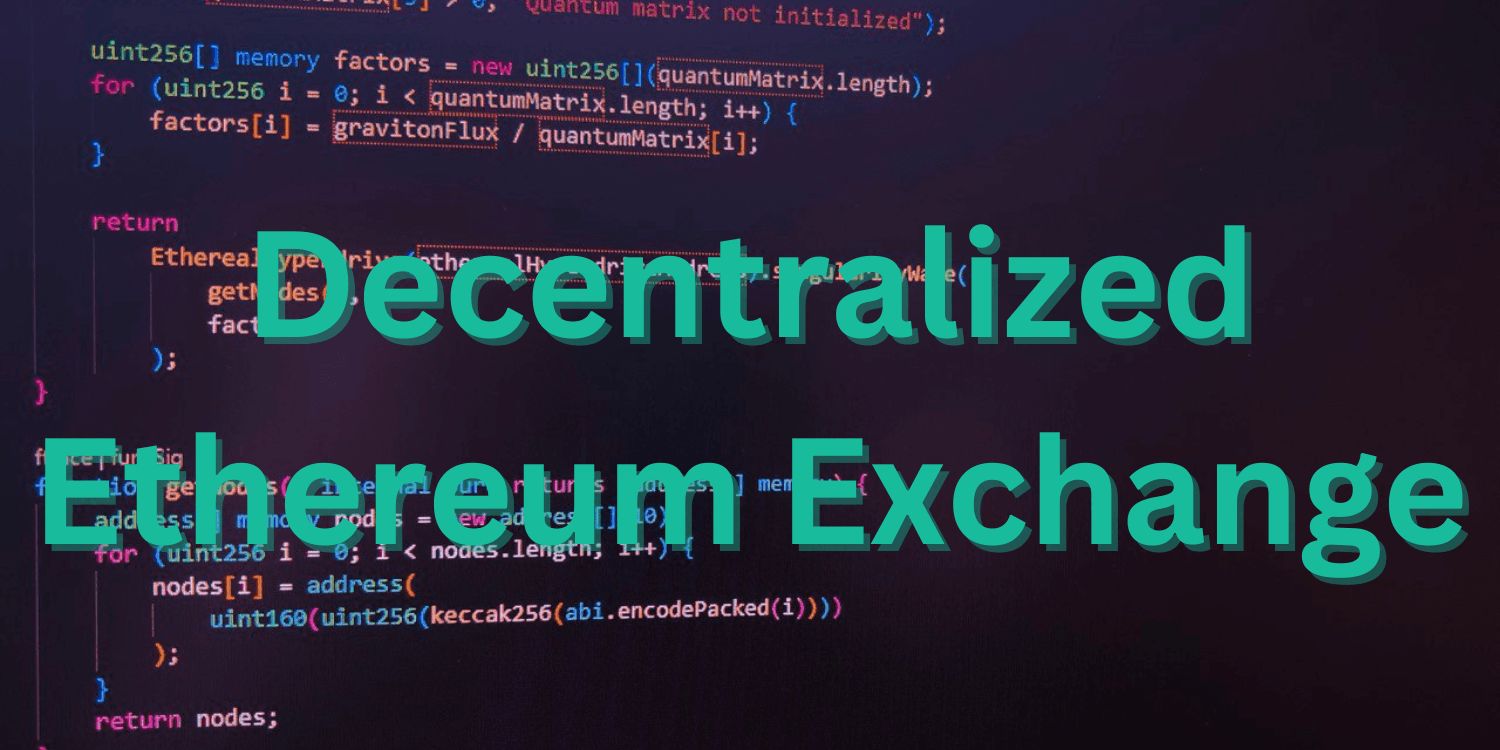
My Projects: Decentralized Ethereum Exchange
January 26, 2024
Paul Simroth
In this article I go over another one of my coding projects. This time I walk you through my project coded as part of the course Ethereum Smart Contract Programming 201 at Moralis Academy. It is a Decentralized Exchange. Read this article to find out more!
- Projects
My Projects: Building a Decentralized Exchange (DEX) on Ethereum
In the ever-evolving landscape of blockchain technology, Ethereum stands out as a pioneering platform, enabling the creation of decentralized applications (DApps) and smart contracts. Embarking on my journey into Web3, I undertook the task of developing a decentralized exchange (DEX) using Truffle and OpenZeppelin. This project, created as part of the Ethereum Smart Contract Programming 201 course at Moralis Academy, served as a hands-on exploration of Ethereum's capabilities while also giving me a chance to improve my skills in smart contract development.
You can check out the code HERE!
What is A DEX?
A decentralized exchange (DEX) is a type of cryptocurrency exchange platform that operates without a central authority or intermediary. It allows users to trade digital assets directly with each other, offering increased security, transparency, and control over their assets compared to traditional centralized exchanges.
The Ethereum DEX Project
At the core of this project lies the Ethereum DEX – a decentralized exchange facilitating trustless asset exchanges on the Ethereum blockchain. The project itself consist of multiple smart contracts, namely a Wallet Contract, an ERC20 token, which only exists as a Mock Token and finally the DEX Contract. The Ethereum DEX project comprises two integral components: the wallet contract and the DEX contract. The wallet contract acts as a foundational layer for managing user balances, while the DEX contract orchestrates the exchange functionality. Included in this project are several tests. The project itself was developed using Truffle.
If you want to develop Smart Contracts using Truffle you can get started HERE.
Exploring the Features
One of the distinguishing features of this Ethereum DEX is its support for both market orders and limit orders, catering to a diverse range of trading strategies within the decentralized landscape. Market orders enable immediate execution at the prevailing market price, while limit orders empower users to set specific price thresholds for their trades, providing greater control and flexibility in trading activities.
Central to the functionality of the Ethereum DEX is the order book, which is automatically managed within the smart contract. Leveraging a bubble sort algorithm, the order book organizes and prioritizes incoming orders based on their respective prices and sides (buying or selling). This algorithmic approach ensures an efficient and transparent order matching mechanism, fundamental to the operation of any exchange platform.
About DEX Architecture
The way the orders are handled in this DEX is a now outdated method. Current DEXs use Automated Market Makers instead.
What exactly is an automated market maker (AMM)? AMMs, a category within decentralized exchanges (DEXs), utilize algorithmic systems known as "money robots" to streamline the process of buying and selling cryptocurrency assets for individual traders. In contrast to traditional order book systems where users trade directly with each other, AMMs facilitate trades directly through their platform. Market makers, on the other hand, are entities responsible for ensuring liquidity for a tradable asset on an exchange that may otherwise lack liquidity. They achieve this by engaging in buying and selling activities from their own accounts with the aim of generating profits, often through the spread - the difference between the highest buy offer and the lowest sell offer. Through their trading activities, market makers contribute to liquidity, thereby reducing the price impact of larger trades. Although various designs for decentralized exchanges (DEXs) exist, AMM-based DEXs have gained immense popularity due to their ability to provide extensive liquidity for a diverse array of digital tokens.[1]
About Market Orders and Limit Orders
Market orders play a pivotal role in facilitating swift and seamless transactions. The createMarketOrder function within the DEX contract enables users to execute market orders, ensuring fair and efficient trade execution while upholding the principles of decentralization and transparency.
Beyond market orders, the Ethereum DEX empowers users with the ability to create limit orders, offering greater control over their trading strategies. By specifying price thresholds, users can strategically enter and exit positions, tapping into the decentralized exchange with precision and foresight.
Conclusion: Embracing the Future of Finance
The journey of building the Ethereum DEX has been a profound exploration of Ethereum's capabilities and the transformative potential of decentralized finance. From developing the Smart Contracts to running the necessary tests, every step has deepened my understanding of Solidity, blockchain technology and its implications for the future of finance.
In summary, the Ethereum DEX project embodies the fusion of my theoretical knowledge and practical implementation in decentralized finance. With its robust architecture, innovative features, and implementation, this project stands as an example to the transformative potential of blockchain technology in reshaping the future of finance.
Join the Web3 Revolution
As we stand on the brink of a paradigm shift in finance, fueled by the principles of decentralization and transparency, there has never been a better moment to dive into the world of Web3. Whether you're a recruiter seeking top talent in Ethereum development or an enthusiast eager to explore the vast landscape of decentralized finance, let's connect and embark on this transformative journey together!
Citations
[1] Chainlink, Education Hub: What are Automated Market Makers (AMMs)?, Link: https://chain.link/education-hub/what-is-an-automated-market-maker-amm
